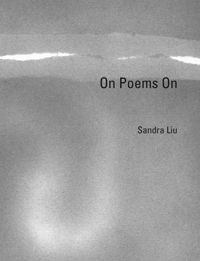 On Poems On
On Poems On
by Sandra Liu
Ugly Duckling Presse, 2012
28 pages / $8 Buy from UDP
Even though there’s nothing particularly insular or fragmentary about Sandra Liu’s work, it’s still difficult to grasp exactly what’s going on in the book because of the restless nature of the poems’ wanderings through landscape, experience, character and image. Nominally this is free verse written in standard syntax, but individual lines or sentences in Liu’s poems aren’t trustworthy indicators of what might come next. This is always a good thing, because the unpredictability adds to the poems’ allure and as I read through the chapbook I found myself drawn closer and closer to whatever sharp turn the poem might next, unless there’s no sharp turn or the poem cuts off abruptly. The poems in On Poems On are a ceaseless lateral movement along or between landscapes either literal, linguistic, or informative that leave you with a sense of having visited a location or moment without being allowed to linger long enough for details of daily life to become mundane.
This isn’t to say that the poems are particularly wild, save for the punctuations throughout the book of often deadly violence; the work is measured and light, and could pass as graceful observational poetry if there weren’t more at work, like the aforementioned violence. A good example of this is “Static,” in which dryly delivered information about the geography of and south of Indonesia is woven together with scenes of rioting crowds gunned down by state forces:
archipelago, grenades, AK-47s,
household bombs and machetes alternate with an underwater
topography, flats of nadir in several areas of the city and extended airscaping
ridges
leading to Halmahera,
itself comprising four peninsulas, each,
a 12-year-old boy, drawn out by congeries of islets,
traversed by SUV.
My first reading of that produced an actual boy run over by an SUV during sectarian violence, but it’s maybe more plausible that the region Liu describes is itself a boy, restless and violent. In “Static” and in other poems Liu contrasts blunt fact with an ambiguity of that fact’s application, which turns what might otherwise be nature-heavy first-person reportage into a tenuous history-in-the-making. This is true elsewhere, and its matter of fact delivery makes it eerie as in “dither here”, in which a man casually mentions to the poem’s narrator their plumber was “shot in the head five times” as part of casual conversation. As much as Liu spends time offering a wealth of even detail, there’s a sense for the characters that populate the poems that what they witness or participate in isn’t to be taken for granted.
Elsewhere, ambiguity blurs nature with self and image, as in “Turtle”—
She’s not sure,
why she’s dressed this way.
In the mirror, the dark silk of her folds
contrasts with the pale green velvet cushion.
Still, midnight blue is a beautiful color,
although navy is the actual color of the sky.
The comma splice after sure connects bird and clothing in an ambiguous way, just as the poem itself flickers back and forth between fact and uncertainty. The catalog of colors also is indicative of how the poems work, color serving as pivot point between disparate images. As serene as some of the poems seem at first glance, like the sunsets and night skies Liu returns to in several of the poems, something is always left in question, not just open to readerly interpretation but offered with a hint of doubt, as in “Take a look at this”:
across from me, probably a one-block distance away,
billows;rests; billows. A plastic bag; an apron, maybe a skirt;
a plastic bag.
You can gather from the examples here the general tone and style of the poems in the chapbook, though some are slightly torqued by mid-word line breaks or phrases offered instead of full sentences, but what you have, and why it’s worth your time, is a poetry constantly restless even when everything appears perfectly calm. Even a plastic bag (if that’s what the poem’s narrator sees) is questionable: it might be something else, and the act of finding out reads throughout the chapbook as both difficult and necessary. The poems in On Poems On are generally modest in diction and vocabulary, but nonetheless there’s the restlessness present beneath the observation that lifts the poems out of sculpted observation into restless surveying that rewards multiple reads and keeps you moving as reader through the poems and pages. On Poems On is a book of shifting terrain, one that you always want to walk regardless of whether it leads to billowing curtains or girl soldiers. It’s a world you’ll want to visit and linger in, even as, in a line from the chapbook’s title poem, “Further, rules will need fleshing out.”
***
Nicholas Grider is an artist and writer whose work has recently appeared in Conjunctions and Drunken Boat.
Tags: nicholas grider, On Poems On, Sandra Liu, Ugly Ducking Presse
